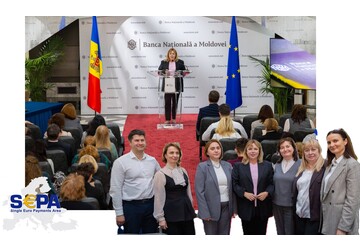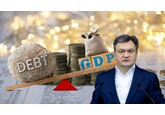
Moldova's accession to the Single Euro Payments Area (SEPA) will change the country's economic future and bring significant economic benefits – the NBM
This was stated by Anca Dragu, Governor of the National Bank of Moldova (NBM), at a meeting with teachers of economic schools, with whom she discussed Moldova's accession to SEPA, a system designed for cross-border bank transfers in euros, as well as the benefits of the accession for citizens and the economy. “Today we are discussing a payment system that will change the economic future of the country. Moldova's integration into the Single Euro Payments System will bring significant economic benefits at all levels by facilitating financial transactions between Moldova and other European countries. The accession to SEPA will contribute to the reduction of expenses on cross-border payments, will facilitate the access to modern financial instruments and will be an important incentive for the development of the national economy,” the NBM head said. Anca Dragu also emphasized the role of teachers in forming a clear and deep vision of the students about the consequences of our country's accession to SEPA and the importance of the commitments that teachers assume every day to transmit economic knowledge to future specialists. The event was interactive and included meaningful discussions and exchange of ideas regarding the opportunities offered by Moldova's accession to SEPA, the actions undertaken and the next steps to be taken. In this context, the discussions emphasized the responsibility of economics teachers to provide students with a more comprehensive understanding of international economic and financial processes. Representatives of the Academy of Economic Studies of Moldova and the State University of Moldova had the opportunity to interact with the participants, noting the importance of an educational program adapted to the international economic realities and the current needs of the financial markets. The vice-rector of the Academy of Economic Studies of Moldova, Victoria Cociug, said that the time has come to rethink the role of school and university in training responsible citizens. According to her, the curriculum should be adapted to the new economic realities: digitalization, financial innovation, sustainability. “Financial education should be introduced not only as an optional subject, but also as an integral part of youth and adult education. We propose an integrated approach - in partnership with the NBM, financial institutions, public sector and academia - to develop real, useful and applicable skills,” she said. For her part, Maria Hamuraru, Dean of the Faculty of Economic Sciences of the State University of Moldova, said that the modernization of the curricula by integrating relevant topics, such as the infrastructure of modern payment systems, digital banking and SEPA regulations, reflects the commitment to provide students with relevant training adapted to the requirements of the labor market. “Through these initiatives, we aim not only to improve the quality of professional training, but also to strengthen financial culture among young people, a crucial factor for the sustainable development of the national economy,” she emphasized. In conclusion, Anca Dragu emphasized the importance of cooperation between financial authorities and economic education institutions in training new generations of professionals who will contribute to the consolidation of a more efficient economic system and will be better connected to the global market. // 09.04.2025 - InfoMarket







